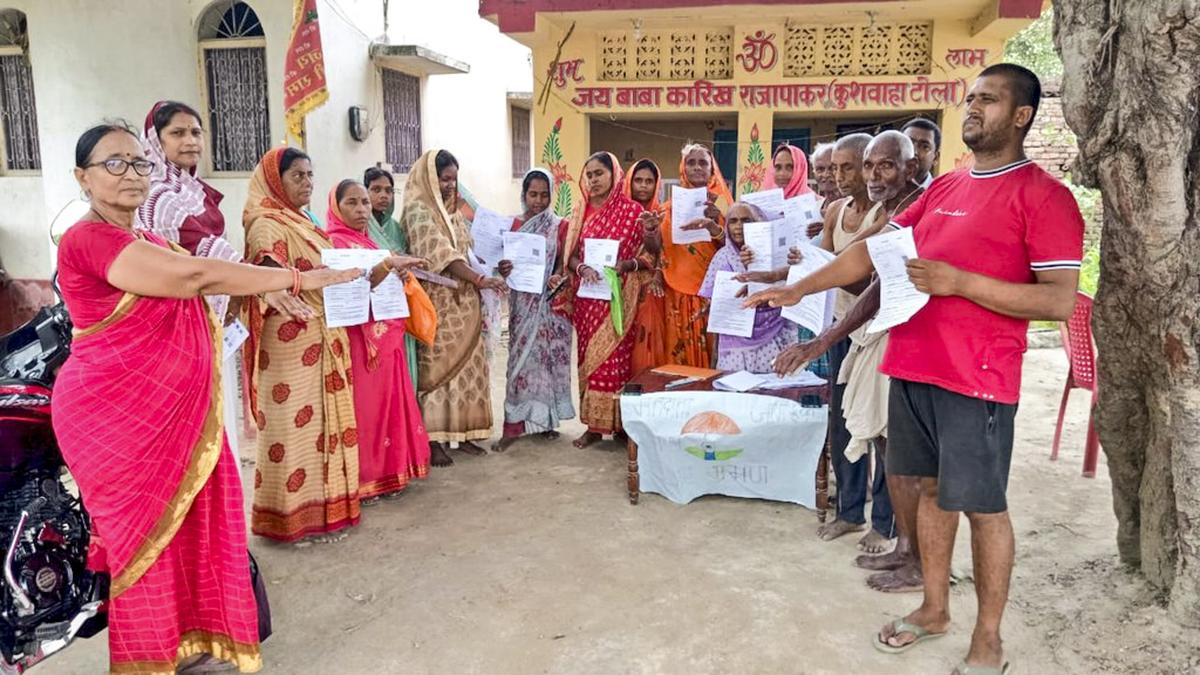Voters show the enumeration forms given by a Booth Level Officer (BLO) during the ongoing Special Intensive Revision of electoral rolls in Vaishali district, Bihar. Photo: X/@ECISVEEP via PTI
The Supreme Court on Monday (July 7, 2025) agreed to urgently hear on July 10 a batch of petitions challenging the legality of the special intensive revision (SIR) of electoral rolls being conducted by the Election Commission in poll-bound Bihar.
The petitions were mentioned for early hearing before a Bench of Justices Sudhanshu Dhulia and Joymalya Bagchi by a battery of lawyers, including senior advocates Kapil Sibal, A.M. Singhvi, Gopal Sankaranarayanan, and Shadan Farasat.
The petitioners for whom the mentioning was made in the morning included Rashtriya Janata Dal MP Manoj Jha, Trinamool Congress MP Mahua Moitra, non-governmental organisations Association for Democratic Reforms and People’s Union for Civil Liberties, and activist Yogendra Yadav.

However, the day saw the challenge against the exercise gain further momentum, with leaders from various other Opposition parties, including K.C. Venugopal of the Congress, Supriya Sule of the Nationalist Congress Party (SP), D. Raja of the Communist Party of India, Harendra Malik of the Samajwadi Party, Arvind Sawant of the Shiv Sena (UBT), Sarfraz Ahmed of the Jharkhand Mukti Morcha, and Dipankar Bhattacharya of the CPI(ML) Liberation moving the top court.
Mr. Sibal informed the Bench that the need for an urgent hearing and an interim relief of stay of the June 24 notification announcing the SIR exercise in Bihar was necessary as crores of voters from the poor and marginalised sections of the society had been put on a tight leash to produce documents to prove their domicile or face the prospect of disenfranchisement.
The senior counsel said the last date for the submission of the enumeration forms was July 25. The applicant’s name would not feature in the draft electoral rolls, to be published on August 1, if the forms were not submitted in time.
The Bench asked the petitioners to supply the Union government, the Election Commission, the Attorney-General of India, and other respondents with copies of their petitions in advance.
‘No prior consultation’
The petitioners’ side urged the Bench to issue notice to the Election Commission and ensure that the poll body explain its “ill-timed and hasty” decision to conduct the SIR exercise in Bihar.
Mr. Jha, in his petition, argued that the decision was taken by the poll body without prior consultation with political parties and would be employed to “justify aggressive and opaque revisions of electoral rolls that disproportionately target Muslim, Dalit, and poor migrant communities”.
The petitioners contended that the SIR process violated the provisions of the Representation of People Act, 1950 and Rule 21A of the Registration of Electors Rules, 1960. The petitioners argued that the SIR shifted the onus of being on the voters’ list from the state to the citizens.
Appearing for the Association for Democratic Reforms, advocate Prashant Bhushan said the SIR process had “excluded identification documents such as Aadhaar or ration cards which further make marginalised communities and the poor more vulnerable to exclusion from voting… As per estimates, over three crore voters and more particularly from marginalised communities (such as SCs, STs, and migrant workers) could be excluded from voting due to the stringent requirements as mentioned in the SIR order”.
The NGO submitted that reports from Bihar show that lakhs of voters from villages and marginalised communities do not possess the documents as required under the SIR notification.
Published – July 07, 2025 11:08 am IST
